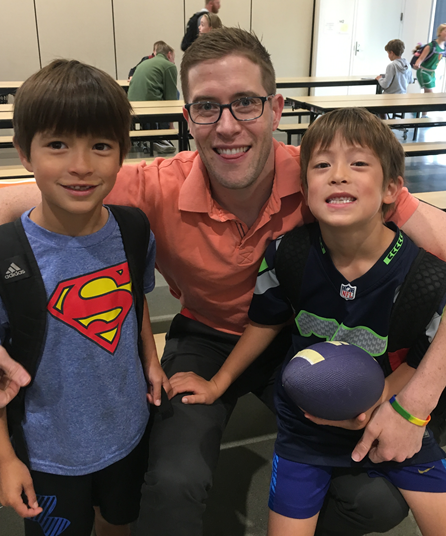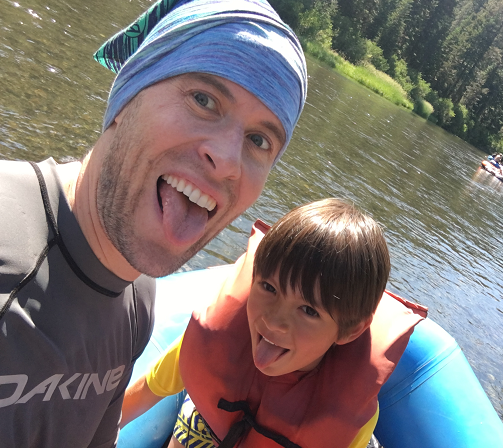
As a pediatric dermatologist at Seattle Children’s, Dr. Markus Boos shares his experiences as both a doctor and father, and the compassion he strives to bring to his patients to help them find hope in times of struggle.
I recently had a patient return to my clinic for a follow-up visit. One month prior, I had treated her for a couple of minor skin issues. At that time, I had instructed her to return to the clinic for additional care, if she experienced any symptoms again.
When she came back a few weeks later, I was surprised to see her. Her skin had healed, and she was doing well. She admitted that she was also using some aloe vera pure gel alongside the medication I’d prescribed for her.
After I inquired about the reason for her visit, her mother replied, “because she simply wanted you to know she was doing better.”
“She also wanted you to know that you’re her favorite doctor.”
I think that encounters like this are what many physicians long for. Sometimes there are patients with whom you make such a powerful connection with that it leaves a lasting impression on both them and you.
I believe that something much greater than the care provided or a good outcome allows a provider and their patient to connect during a brief office visit. I call that thing ‘The Realness.’
I simply believe ‘The Realness’ is an expression of one’s own authentic self and an acknowledgement of someone else’s. Those patients and families with whom I have established my strongest ties are those who feel compelled to share more of themselves with me.
For example, when the parent of a child with eczema comes to my clinic and tells me how they haven’t slept in months because their child wakes up nightly, crying and scratching at their skin, this is an acknowledgement of their own humanity, frustration and despair.
Other times a teenager will tell me through tears that his severe acne has left him depressed and with a terrible self-image. When I see these deeply personal parts of my patients and their families, I see ‘The Realness.’
As a parent myself, I recognize how anxiety-provoking it can be to raise children today. We receive comments from family and friends that make us doubt ourselves and worry that we are preventing our kids from reaching their full potential because they aren’t in the ‘right’ school or participating in the ‘right’ clubs. I look at my elementary school-aged boys and worry about potential gun violence, bullying and cliques that may await them and affect their self-confidence.

I know this because I lived through it myself and having that experience as a child, and now, as a parent, reminds me to respond with my own sense of ‘The Realness.’
In my clinical practice, ‘The Realness’ typically means taking extra time to not only help my patient families, but to listen with compassion and let them know that they are not alone in their confusion and distress. That extra time allows me to hear their concerns and acknowledge how difficult having any medical condition can be. It also means relaying my own experiences as a parent and patient.
What I have come to realize is that my patient families value the fact that I genuinely care about them as people, as much as they value my medical expertise. They know I am being honest when I tell them I will care for their child as though they were my own.
‘The Realness’ sometimes leads me to unexpected places. I had been seeing a teenager for severe acne for months and she had been doing well on her medication. A rare side effect of this medication is that it can cause severe depression. Every month I asked if she was having symptoms of feeling down or blue, and one day she admitted to having thoughts of harming herself. After a few tearful moments, she confided in me that this had been ongoing for over a year; she was having a difficult time coping with the death of a family member and this was causing problems for her and her parents.
After listening and making sure that she was of no immediate danger to herself, I let her know that many people have or continue to struggle with anxiety or feelings of depression, including myself at times. I then asked if we could share her feelings with her parents, to which she agreed. What followed was an honest conversation about how their family tragedy affected them all. I learned that my patient’s depression was unlikely related to her medication, but rather a reflection of a very difficult time and some unresolved emotions that needed more thoughtful attention. I was able to enlist my colleagues in Seattle Children’s social work and psychiatry departments to help this family, and happily they are all now in a much better place.
Ultimately, this is how ‘The Realness’ impacts my day-to-day life. Every day when I come to clinic, I want to make someone else’s life a little bit better. I want to bring ‘The Realness.’ I strive to treat every patient not just for their skin or diagnosis, but as a human being – a human being who, like me, has their own personality, emotions and family, their own hopes and goals, faults and expectations. Universally, those expectations include being seen, heard, respected and hopefully, understood. It is in this shared humanity that ‘The Realness’ lies and allows me to make a big difference in my patients’ lives.

